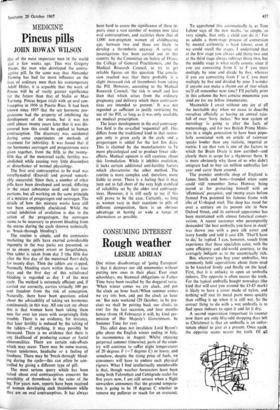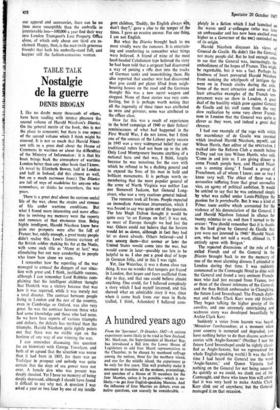Rough weather
CONSUMING INTEREST LESLIE ADRIAN
One 'minor disadvantage of 'going European' is that it destroys our Old mnemonics withoui putting new ones in their place: Ever since schooldays, my biannual obligations to Father Time have been recalled by the doggerel verse, 'When winter comes we cry alack, and put the clock an hour back/When summer comes we cry tres bon, and put the clock an hour on.' But next weekend (29 October, to be pre- cise) we shall be putting back our clocks to GMT for the last occasion, and four months hence (from 18 February) it will, by kind per- mission of Her Majesty's Government, be Summer Time for ever.
This edict does not invalidate Lord Byron's gibe about the English winter ending in July, to recommence in August. Whilst enjoying perpetual summer (timewise), parts of the coun- try will continue to' suffer night temperatures of 20 degrees F (-7 degrees C) or lower, and somehow, despite the rising price of fuels, we consumers will have to endure such physical rigours. What I find intellectually unendurable is that, though weather forecasters have been using both Fahrenheit and Centigrade scales for five years now, I am still unsure when a flight stewardess announces that the ground tempera- ture is going to be 18 degrees C whether to remove my pullover or reach for an overcoat. To apprehend this automatically is, as Tom Lehrer says of the new maths, `so simple, so very simple, that only a child can do it.' For us adults a three-stage process of conversion by mental arithmetic is hard labour, even if we could recall the stages. I understand that at the first stage you always add thirty-two and at the third stage always subtract thirty-two, but the middle stage is what really counts; since if you are converting from C to F you must multiply by nine and divide by five, whereas if you are converting from F to C you must multiply by five and divided by nine. I wonder if anyone can make a rhyme out of that which we'll all remember next time? I'll joyfully print in this column the best concise mnemonic you send me for my fellow innumerates.
Meanwhile I await without any joy at all the inevitable day when we cease to describe ourselves officially as having an annual rain- fall of over 'forty inches.' No new system of metrology • is going to alter the facts of meteorology, and for two British Prime Minis- ters in a single generation to have been popu- larly associated with an article of • rainwear speaks louder than any statistic, imperial or metric. I see that rain is one of the, factors to which the Brain Drain is now ascribed—and clearly there is scope for a rhymester there. It is more obviously why those of us who didn't emigrate had to buy, six million umbrellas last year and carry them around.
The premier umbrella shop of England is James,Smith and Sons—founded when some could still _remember Jonas Hanway being jeered at for protecting himself with an 'effeminate' parapluie, and twenty years before Samuel Fox, patented his famous frame with ribs of U-shaped steel. The shop has stood for over a century on its present site in New Oxford Street, and its outward appearance has been maintained with almost fanatical conser- vatism. A recent customer who peremptorily demanded 'the best umbrella you have in stock' was shown :one with a pure silk cover and ivory handle and told it cost £26. 'That'll hive to do,' he replied. I can, however, vouch frqm experience that these specialists cater, with the same efficiency and old-world courtesy, to the averagely indigent as to the eccentrically rich. ' But, wherever you buy your umbrellas, two commonly held superstitions about them need to be knocked firmly and finally on the head. First, that it is unlucky to open 'an umbrella indoors. The opposite is often nearer the truth. Por the typical umbrella bought nowadays (the kind that will cost you around the L3-£5 mark) is likely to have a cover made of nylon, and nothing will rust its metal parts more quickly than rolling it up when it is still wet. So the correct thing to do with a wet umbrella is to find space indoors to open it and let it dry.
A second superstition (important to counter now there are only fifty-odd shopping days left to Christmas) is that an umbrella is an unfor- tunate object to give as a present. Once again, the opposite seems nearer the truth. Of all
our apparel and accessories, there can be no item more susceptible than the umbrella to irretrievable loss-100,000 a year find their way into London Transport's Lost Property Office alone, of which only about one third are re- claimed. Happy, then, is the man (with generous friends) that hath his umbrella-stand full; and happier still the fashion-conscious woman.



































 Previous page
Previous page